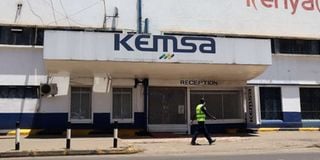Premium
Kemsa on spot over illegal warehouses, unlisted drugs

Kenya Medical Supplies Authority (Kemsa) offices in Nairobi in this picture taken on Sunday, October 04, 2020.
What you need to know:
- A recent audit by the Pharmacy and Poisons Board has revealed that all the Kemsa depots are not registered by the board.
The audit also revealed that in all the warehouses, the list of suppliers of medical commodities was not available.
The Kenya Medical Supplies Authority (Kemsa), which is embroiled in corruption allegations over Covid-19 tendering, is also in trouble for irregularly establishing and operating warehouses and dispensing unregistered products.
A recent audit by the Pharmacy and Poisons Board (PPB) has revealed that all the Kemsa depots are not registered by the board and all have not been complying with the good distribution practices, which could compromise safety, efficacy and quality of the healthcare.
The regulator has, therefore, given the agency six months to register 10 of its warehouses that were illegally established or risk closure. Inspections done in all the 10 warehouses established that none of them is registered, which means as per the board’s guidelines, they are operating outside the system.
“They are assuming and operating as a government entity, however, even if it means not paying anything to register, they are supposed to register for us to inspect whether they are complying,” said PPB chief executive officer Dr Fred Siyoi.
Dangerous
The audit also revealed that in all the warehouses, the list of suppliers of medical commodities was not available.
“This is very dangerous and could compromise the quality of some of these products that they are procuring. Could it be that they just refused to hand over the list because of the ongoing investigations?” Dr Siyoi asked.
The national audit to establish compliance with the July 2019 Guidelines on Good Distribution Practices for Medical Products and Health Technologies in Kenya found out that drugs stocked in some of the stores were not registered by the board.
For instance, of the 16 products at Eldoret depot subjected for validation, only eight were found on the list of registered products. A majority of those that could not be validated were infusion fluids.
Also during the audit, the Moi Teaching and Referral Hospital returned some syringes and needles and the reason cited was that they were not meeting user specifications.
In the Kisumu warehouse, out of the 16 products verified, 13 had been registered but three had no history of retention in the PPB online product portal.
Dr Siyoi told the Sunday Nation that all the drugs that were not registered by the board were recalled and will be analysed and corrective action will be taken.
Qualified products
“After the analysis, the drugs found not to meet the standard, will be destroyed and an action will be taken against the manufacturer. Still even if they meet the standard, the manufacturer will be blacklisted until the products are registered with the board,” Dr Siyoi said.
He said the practice was dangerous for a government entity trusted with the mandate of procuring qualified products on behalf of Kenyans.
“When they are not registered it becomes difficult to do an inspection that is why going forward, all the warehouses must be registered for us to monitor whether they are complying with the guidelines,” he adds.
In Embakasi, which is the central stores headquarters warehouse that supplies the rest, a clerk mans it. Yet, he is not a pharmacist nor a pharmaceutical technologist, says audit.
It revealed that the health products are handled by none medics including pickers, inventory clerks and loaders who are not aware of anything on how to handle the products.
“There is an undefined organisational structure and the qualified personnel are not in direct control of controlled drugs, cytotoxic or explosive products. This can be dangerous,” revealed the audit.
List of suppliers was not available, they are highly guarded and kept at Kemsa Commercial street office.
Garissa warehouse from the findings was very dirty, dusty and poorly cleaned. The state of repair is not well painted and the floor is not smooth, no tiles for easy cleaning and grooming.
Nakuru warehouse by design doesn’t adequately support appropriate and desirable hygiene standards, temperature and humidity provisions. The audit noted absence of ceiling and alongside open space between walls and the roofing.
“Observed dusty surfaces partly emanated from these inadequacies. Temperature and humidity excursions are highly likely in the circumstances,” the audit revealed.
Mitigation measures with respect to the foregoing observations or risks (excursions) weren’t in place including absence of air-conditioning – fans in the warehouse.
Infrastructure
The purpose of the visit was to carry out inspection for compliance with the requirements of Cap 244 laws of Kenya; including the infrastructure and the personnel establishment, and to give recommendations on how to strengthen the commodity management in the facility.
The audit was also extended to other facilities and in total close to 1224 pharmaceutical outlets and 49 County Referral and Sub County Hospitals. Through this, 271 pharmaceutical outlets across the country have been closed down for failure to adhere to GDP regulations.
In Nyanza and western 62 were closed, North Rift and South Rift Regions 19, Central and Upper Eastern Regions,15 outlets, Coast and Lower Eastern Regions 71, Nairobi Region 83 while in North Eastern Region 21 pharmaceutical premises were closed.
The Board in its recommendation to Kemsa warehouses, states that the depots should employ qualified pharmacists and pharmaceutical technologists to oversee the handling of products, especially the controlled drugs.
“The depots to apply for registration of premises license as well as annual practice license for all pharmaceuticals personnel employed in the facility from the Board,”





